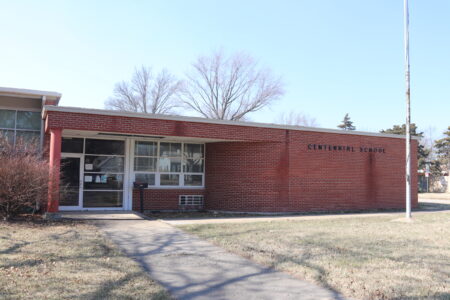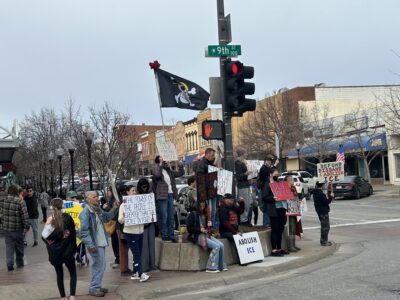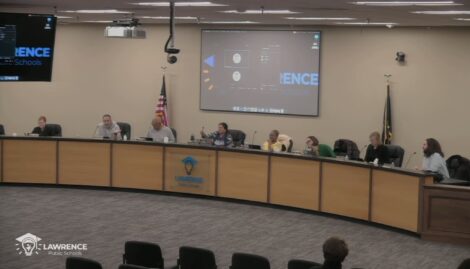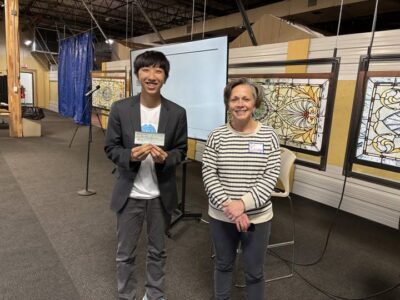Lawrence school board candidates share how they would apply the First Amendment while in office

photo by: Josie Heimsoth/Journal-World
The Lawrence school district offices building, located at 110 McDonald Dr., is pictured in May 2025.
The Journal-World asked Lawrence school board candidates how they would apply First Amendment principles in office, oversee public meetings, and handle media relations — whether through direct communication or official spokespeople.
Each candidate was asked the question: “As a public official, how would you apply the principles of the First Amendment to your duties, including the governing of public meetings? What would your policy be for interacting with members of the media? For example, would you speak directly with members of the media or make your comments to the media through a government spokesperson?”
Candidates were asked to limit their responses to 150 words, and all seven candidates responded to the Journal-World’s inquiry. Here are the candidates’ responses:
Bob Byers
I am committed to sharing information proactively and as broadly as possible, so the community feels informed and included. My pledge would be to be accessible, honest, and clear while protecting confidential student and/or personnel information. In terms of communication with the media, I would communicate directly, when appropriate, on issues of public interest, accountability, or board policies. However, I would enlist a designated spokesperson for routine matters or to ensure a consistent message.
ChrisTopher Niles Enneking
The feelings of our elected officials can’t take priority over our Constitutional Rights. It pains me to see our board cite imaginary “safety” concerns as a rationale for banning signs at board meetings and for making it ever harder for community members to have their voices heard at board meetings. I want to reduce those barriers to community involvement by rolling back those restrictions, providing child care at meetings, and advocating for holding meetings at schools where we’ll have more interactions with the educational communities we’re supposed to be serving.
I intend to always be available for the media and to speak for myself instead of filtering everything through our now multitudinous district communications specialists. Waiting to say the right thing has gotten in the way of us starting necessary conversations and prevented healing and trust building. Time to stop excusing silence and let honest communication be the goal!
Kelly Jones
I believe it is essential to be accessible and responsive to members of the media. As such, I have not relied on a government spokesperson to communicate on my behalf. My record reflects that.
There are situations where a board member may be legally precluded from commenting, for example, in matters pertaining to personnel or a child’s privacy. In those cases, I would communicate the preclusion directly to a member of the media.
While I do not rely on a government spokesperson, I respect the critical role and expertise of the USD 497 communication staff. They support families, staff, and the community by sharing timely information and helping explain district decisions and initiatives. As a matter of practice, I often consult with them to ensure that the information I share with the media is as accurate as possible and does not contribute to confusion.
Shannon Kimball
I swore to uphold the law and firmly support the First Amendment’s guarantee of free speech. That means freely allowing differing viewpoints during meetings, especially when I disagree. However, free speech does not protect behavior that disrupts the board’s ability to conduct business. Even-tempered leadership and sound judgment are essential to protecting the rights and safety of all patrons, students, and staff. For example, I’ve calmly navigated tense public comment periods by enforcing meeting rules fairly and consistently.
I have broad experience working with media on board issues. When speaking as an individual board member, I respond directly. For official statements of the board or district, I follow board policy: the superintendent speaks for the district, the board president speaks for the board. When I’ve served as board president, I’ve ensured any statement I made reflected our policies, procedures, priorities, and obligations — representing the board’s collective position accurately and responsibly.
Matt Lancaster
I’ve got a lot of thoughts here, but I think some folks have a distorted view of what “public” means. You can’t just say whatever you want – racist, sexist, threatening, harmful rhetoric – with no repercussions. I would continue to try to make public meetings as safe and welcoming as possible, while respecting the emotions and passion people bring to that space. I absolutely would speak directly with members of the media or the community and have made a reputation for myself in doing so, although I would be clear that some things are off the table – for instance, FERPA information, personnel data, etc.
Pam Shaw
As a public official, I will uphold the First Amendment by fostering open, respectful dialogue in public meetings and ensuring that all voices — especially those historically marginalized — are heard. I believe that civility in public discourse is not a barrier to free speech, but a foundation for it. When we engage with one another respectfully, we create space for genuine listening, thoughtful debate, and collaborative problem-solving.
I am committed to transparency and accountability, which includes speaking directly with members of the media to provide accurate, timely information. My policy will be to engage with the media personally, unless legal or privacy concerns require a designated spokesperson.
Public discourse is essential to democracy, and I will work to create spaces where community members feel safe expressing their views — without fear of intimidation or hostility. That means advocating for public meetings that are accessible, inclusive, and governed by clear rules.
Molly Starr
School board members work together as a team to create policy. Members can interact directly with the media or decline to answer specific questions, as per the topic or their own comfort levels. There are privacy issues for students, staff, and families that can conflict with media questions, but I would be clear about why I may be unable to answer a certain question.
First Amendment freedom of speech rights can help to keep us all accountable, and we should be thankful for community participation and try to listen with empathy, and a goal of connecting residents with resources. The better we work together, the more successful the solutions.






